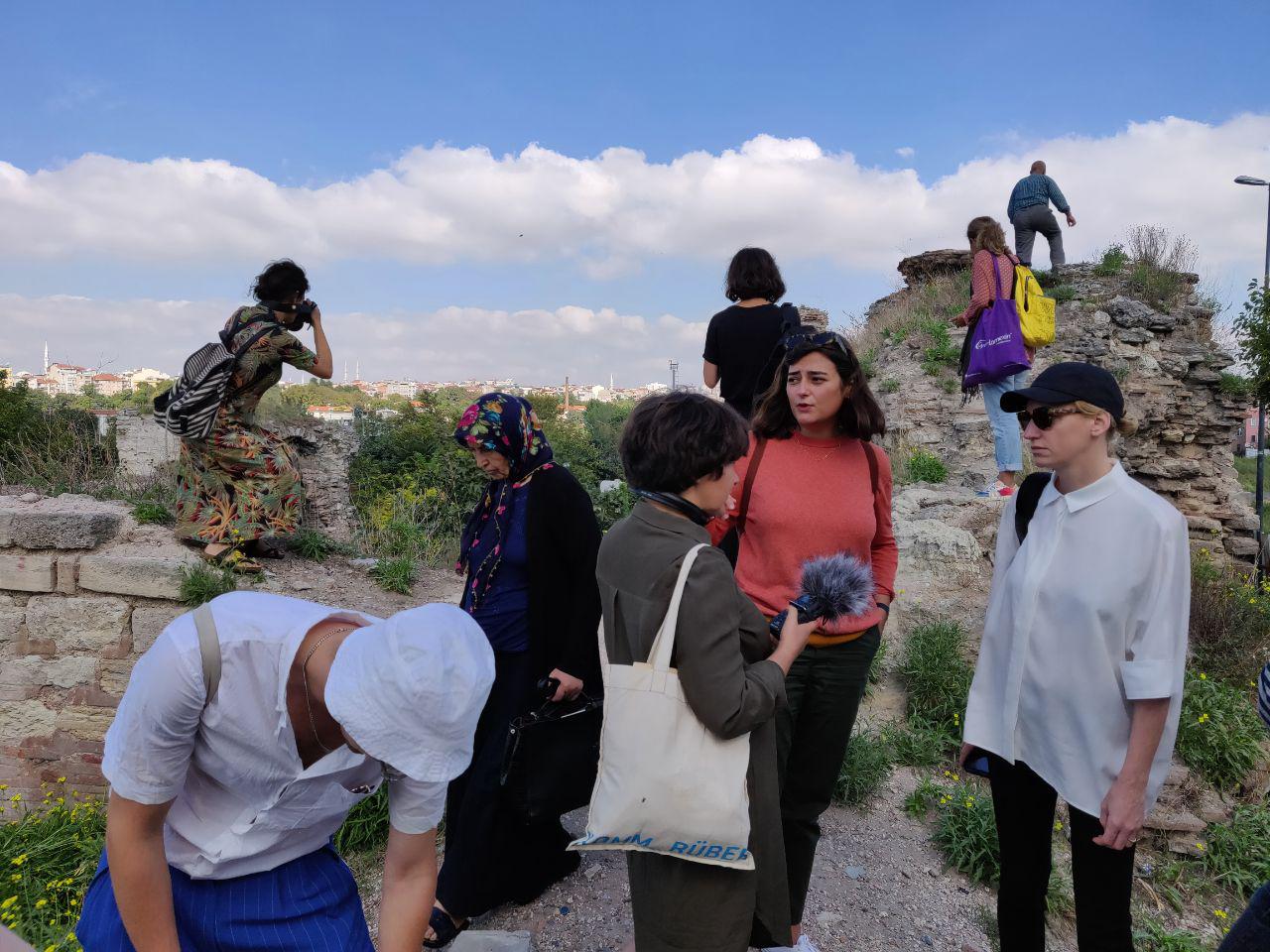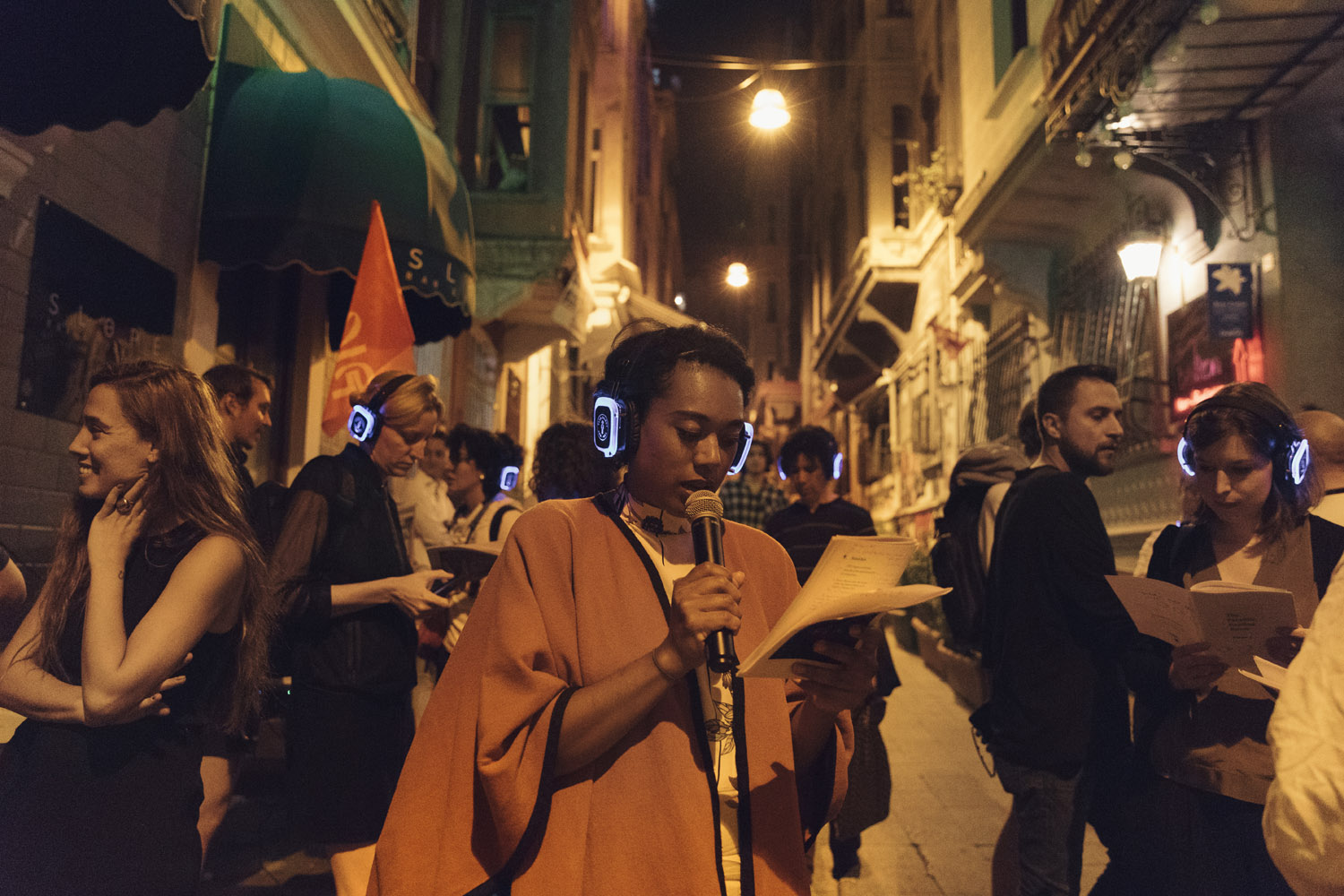Engaged Education: A Review
Making Futures travelled to Istanbul during the opening week of the 4th Istanbul Design Biennale under the banner of “School of Schools”. The workshop’s programme intersected with that of the Biennale but also extended far beyond the walls of its six satellite venues (“pop up” schools) to engage with local activists and initiatives to gain an understanding of and to learn about the contemporary urban condition of Istanbul and how its subjects located their own agency within it. Through the format’s experimental process of engagement, new paths of research were unfolded.
The word “engaged” can be read as both as an adjective – to be occupied or unavailable – and as a verb – to pledge or to become involved. The four-day long Making Futures mobile workshop in Istanbul observed and enacted both meanings of the term that appeared in its title: “Engaged Education”. Through its encounters with different contexts and actors – involved as both invitees and initiators – the mobile constellation developed an ongoing research discussion about the nature of engagement and relation, focusing particularly on the interplay between the “guest” and the “host”.
As the discussion evolved, it prompted new questions about how these relations manifest inside and affect engagement with spaces of education. The conversation was directly applicable in real-time as the modes of engagement displayed and enacted at “School of Schools” proved to be fertile ground for critique. But the guest/host discussion reached beyond this immediate context and opened up new perspectives on how Making Futures might practice – or seek to reconfigure – its own relations of hospitality as the initiator of a future summer school.
A case in point was the first event of the workshop’s programme, a public reading room at the Yapi Kredi Cultural Center (one of the Biennale “schools”) – the first of five that were to take place that weekend in Istanbul, hosted by Ethel Baraona Pohl and Cesar Reyes of publishers dpr-barcelona in collaboration with Making Futures’ Rosario Talevi. Occupying the thoroughfare space of the central staircase, this action, spontaneous, open, communal, was by its own definition parasitic – a mode of relation that is not only dependent upon the existence of a host but also the subjugation of or modulation of the behaviour of that host. In this case, the highly programmed space of international design biennale became a common site in which to “provoke a contagion of knowledge”.
The nonlinear nature of the format, in which anyone(s) could speak and read any of the texts in the provided reader whenever they liked and in a manner they felt most appropriate, also spoke to André Gorz’s positing that meaningful education comes not from something being taught but rather something that is stimulated. The readings spanned a range of fiction and non-fiction, different disciplines and even language but the knowledge produced and disseminated in the space came from the act of engagement itself – that of reading aloud as an act of intimate encounter.
A further incarnation of the reading room took this “contagion” to the streets of Istanbul, this time engaging with not just those in the immediate vicinity but also an audience of remote listeners. As the participants read aloud their voices were further amplified via a mobile, studio-on-a-cart belonging to radioee.net transmitting to readers orbited the studio as it traversed up and down the hilly streets of Beyoğlu. This not only elevated the practice of reading aloud, it also amplified the importance of acting in public as means of locating agency: at various points of its journey, the radio cart’s operators had been required to enter into negotiations – to engage with – the police and others laying claim to that space.
The topic of contested space was on the agenda of the Biennale and interestingly, it was through this framing that the discussion of the host and guest found direct expression as part of its programme. As part of a panel entitled “Urgent Pedagogies: Learning and unlearning through spaces of exception”, Making Futures’ Markus Bader joined Sepake Angiama, Jan Boelen, Magnus Ericson, Joseph Grima, Sandi Hilal, Onkar Kular, Peter Lang, Tor Lindstrand, Pelin Tan and Merve Gül Özokcu. Towards the end of a discussion, which considered a range of methodologies of that might decolonise pedagogy, Hilal made a link with the relations of agency within hospitality – namely how the roles of the guest and the host are shaped or upheld by walls and threshold spaces. As a mobile constellation in its own right, the format Making Futures had adopted during this trip already echoed this thinking. Expanding the question further, Making Futures might ask what outcomes and modes of knowledge transfer is enabled when this hypothesis is applied to the educational institution of the summer school – given that it can be read as a threshold space in itself.
Beyond the Biennale
Further beyond the immediate vicinity of the Biennale venues in the city centre, two walks undertaken by the mobile workshop resonated with this line of enquiry and also provided valuable insights with regard to Making Futures’ explorations of nature of “architecture as a collective form” and “architecture as a resource”. The walks also revealed the consequences of lack of engagement with more marginalised subjects in the city.
The first explored the legal ambiguities that currently surround Istanbul’s market gardens, known as bostan in the neighbourhood of Yedikule. Located in the moats by what was once the city walls of Byzantium, these self-initiated endeavours date back to the seventeenth century and continue to be undertaken by migrants Turkey’s Black Coast region – following Greeks, Armenians, Bulgarians and Albanians before them. Beyond the cultivation of the landscape itself, the gardens became deeply interwoven with the fabric of daily urban life, by supplying Istanbul’s markets with a wealth of produce. An ecosystem of economy underpinned by longstanding cultural practice – and a source of knowledge.
The remains of the walls that backdrop this heritage were themselves put on the tentative list for UNESCO World Heritage status in the early 00s, yet this rich culture of gardening practice has received no so protection – plans to turn pave over the gardens and turn the space into a more formal park were expedited by the awarding, in 2015, of UNESCO status. Some areas of the land have already been subsumed into construction sites that will eventually leave luxury condo developments in their wake. Urban planner and researcher Gözde Sarlak has built up a rapport with the gardeners and walked with participants through the bostan, explaining her reading of their activities as being practices of commoning and maintenance that warrant a formal acknowledgment – and accommodation – by the city.
Here at Yedikule, the host/guest relation emerged once more as Making Futures became guests of hosts that have come to be regarded as parasitic forces in the city. Participants were welcomed around a table in the heart of the gardeners workshop. In an intimate gesture they served tea and biscuits as they relayed, through Gözde Sarlak, their needs for a deeper engagement from the city – not just with the physical site itself, but also the urban practice that is embedded within it. The answer to the question of “what” is protected by these heritage measures is clear. More urgently though, we should be asking who is being protected here? What responsibilities, it could be asked, does they city have as a host of such practice and practitioners?
It was as hosts that Making Futures had also established a relationship with the Centre for Spatial Justice (known under the Turkish acronym of MAD), “cross-disciplinary, independent, demand-responsive urban institute, focused on issues of spatial justice”. MAD’s HQ accommodated participants and invited guests – Adanali, Benjamin Foerster-Baldenius, Ethel Baraona, Merve Bedir, Meriem Chabani,Teresa Dillon, Giliy Karjevsky, Anna Kokalanova, Christof Mayer, César Reyes and Gözde Sarlak – for a work session on Engaged Education, which reflected upon the kinds of educational formats that are needed to stimulate future imaginaries for spatial practitioners. This diverse group brought expertise from both academic and non-institutionalised spheres of knowledge production, and as such were able to exchange a wide variety of experiences and methodologies. The session centred around the question of the nature of engagement in relation to education, strategies for breaking away from institutional logic, and what possibilities the summer school format might offer for doing so.
MAD’s Yasar Adanali later walked the group through Taksim Square and Gezi Park, while outlining the growing depoliticization and commercialisation that was affecting the area. Both these sites that have been borne witness to the competing functions of the space of public authority and the space of public dissidence under the Erdogan regime – most during the protests of 2013 and the 2016 coup d’état attempt. As the tour evidenced, this friction has been mirrored in a less spectacular and more insidious manner just beyond these spaces in Istiklal Avenue, a large shopping thoroughfare that millions of people pass through daily.
In the streets leading off Istiklal, many of the classic hallmarks of gentrification can be seen – new shopping malls and design pop ups in areas previously home to artists. But a process of “reverse gentrification” has also taken place that reflects the more specific context of the city: Starbucks branches have been turned into orientalist baklava a stores and ice cream stands – a performative “Turkey-fying”, Adanali explained, that attempts to woo new visitors from the Middle East following the detrimental effect of various crises upon tourism from the West. While the mobile workshop paused to discuss the nature of these phenomena next to one of the street’s newest (and decidedly empty) department stores, a besuited and sunglass-ed security guard appeared and instructed the group to move out of this – entirely public – space. The exchange was not pleasant, but it learnt an urgency to the conversation that had been taking place just moments before, about what and who is – and isn’t – accommodated as a result of the changes wrought in the area by the political conditions.
The nature of this experience and the others outlined here are indicative of the manner in which the mobile workshop as format operates not only as a research method that engages with a context, but also as a way of establishing protocols for further research and practice that stems from these encounters. The experimental nature of the mobile constellation in Istanbul drew upon protocols that had already been established at the earlier Making Futures’ plug-in at the Floating University in Berlin. These entailed: opening up academia to non-academics, focusing on situated knowledge and what could be learn from the site, and engaging directly with a diverse range of actors to both respond to specific urban challenges and also devise alternative models. These have now been joined by the questions, knowledge and protocols for engagement that were developed in Istanbul and have already begun to inform the next workshop in Palermo. This body of research will culminate in the Summer School and the building of a toolkit for practising otherwise, a resource that allows for agile development while also ensuring an effective transfer and processing of results.
Returning, then, to that discussion about the meaning of the term underpinning the workshop, “engaged”; when considered from the perspective of education, particularly in the fields of architecture and design, these contrasting experiences pointed to the importance of the word’s function as a verb rather than an adjective. That is, to become involved, to enter into a relation with something – such as a city. Most significantly, its reading as a verb demands that we to pay attention to – to engage with – not just what is being said in the classroom, but also the classroom itself.


